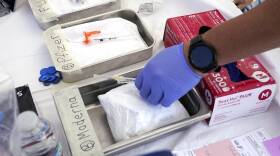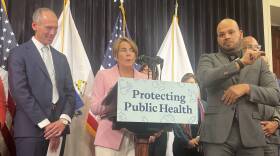-
Mass. health leaders say children under 4, adults over 65 ‘should’ get COVID shots
Children ages six months to 23 months “should” be vaccinated, according to the state’s public health department. -
Mass. moving to protect vaccine access as federal policy shifts
Insurers will now be required to cover all vaccines recommended by the state, and COVID shot appointments should be available soon at pharmacies. -
Vaccination rates falling among health care workers
Eileen McHale, DPH's health care associated infection coordinator, said the department "strongly" recommends that all providers receive their flu shots in September. -
CDC decision sparks concern about access to COVID vaccines for kids and pregnant women
The CDC is no longer recommending the COVID-19 vaccine for healthy pregnant women and children. -
How tracking wastewater from airplanes could help detect the next pandemic
New research from Northeastern suggests taking a look in airplane bathrooms could identify pathogens faster than before. -
Why are COVID-19 vaccination rates so low right now? It’s complicated.
Dr. Nahid Bhadelia says a desire to forget the worst of the pandemic, the politicization of vaccines and changes in accessibility are all contributing factors. -
The US is mailing Americans free COVID tests again. Here's how to get them.
The tests will begin shipping, via the United States Postal Service, as soon as next week. -
COVID spiked in Boston this summer. A bigger spike is probably on the way.
Virus levels in Boston’s wastewater more than doubled May to July. -
What to know about upcoming COVID-19 vaccines and the FLiRT variants
The new COVID-19 boosters could be ready as soon as August. Experts say if you are overdue for a shot, wait for the new formula. -
What to make of the new COVID variants, FLiRT
As much as we would all love to ignore COVID, a new set of variants that scientists call “FLiRT” is here to remind us that the virus is still with us.









